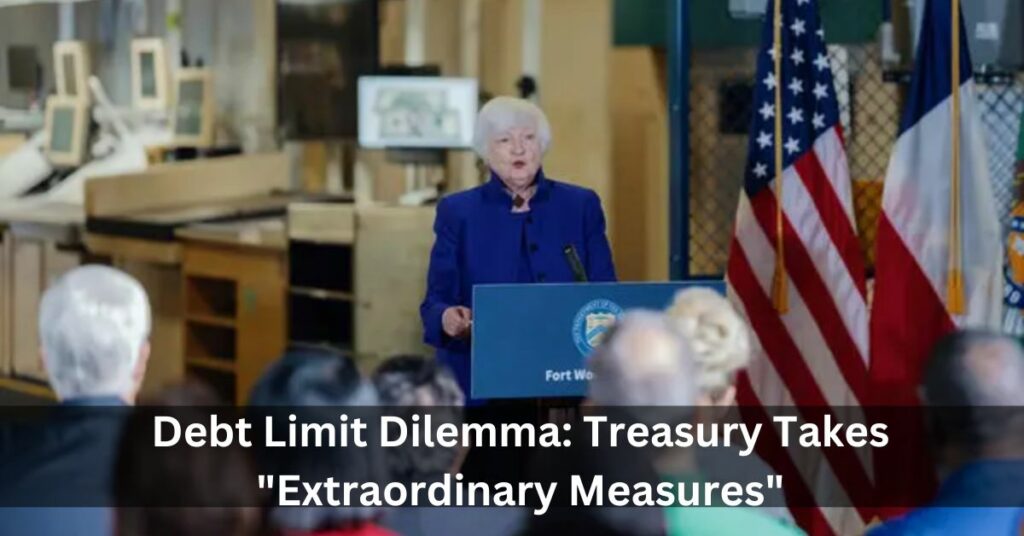Last week, Treasury Secretary Janet Yellen formally informed Congress that after the US reaches its $31.4 trillion debt ceiling on Thursday, the agency will need to start adopting “extraordinary measures.”
However, the country has not yet reached the debt ceiling crisis point that may crash the financial markets, halt senior people’s Social Security benefits, harm the economy, and unleash other calamities. The so-called extreme measures are intended to prevent that momentarily.
While they may sound severe, they are mostly accounting tricks that the Treasury Department can use secretly to buy time for Congress to raise or suspend the limit before the US is forced to stop paying its bills. Steven Pressman, an economics professor at The New School, stated that there is no acute economic crisis.
However, these actions don’t continue forever. They’ve previously given lawmakers anywhere from a few weeks to several months to deal with the borrowing cap. The tax money the government receives this spring will also impact how long the nation can avoid defaulting.
In her letter to the legislature last week, Yellen cautioned lawmakers that it is doubtful that the government will use up all of its cash and exceptional measures before early June. She asked lawmakers to “act promptly” because there is “much uncertainty” surrounding that forecast, she added.
Congress has given Treasury Secretaries the authority to take extraordinary actions to prevent default. Secretaries have taken such steps in both Democratic and Republican administrations.
Yellen expects to liquidate current holdings and halt reinvestments in the Civil Service Retirement and Disability Fund and the Postal Service Retiree Health Benefits Fund this time. Additionally, she is stopping the Federal Employees Retirement System Thrift Savings Plan’s reinvestment in a fund of government securities.
Read More:
- Ziggurat Office Asset In West Sacramento Trades With $83 Million Debt Package
- GE announces its energy efficiency business is up for sale as it cuts debt
The special-issue Treasury securities in which these monies are invested count against the debt ceiling. By taking these measures, Yellen would temporarily increase the agency’s capacity to continue financing the federal government’s operations while lowering the amount of outstanding debt subject to the limit.
No retirees will be impacted, and the funds will be fully returned if the deadlock is resolved. According to Pressman, the government owes this money to itself. “The administration has pledged to pay it back. The debt ceiling is the only factor contributing to its current predicament.
Even the threat of default puts our economy on the line.
The debt limit was increased in a bipartisan way 3 times when Donald Trump was President, and GOP leaders must do the right thing to protect our economy. This is no time for partisan brinksmanship.https://t.co/npeB10zubh
— Rep. Gwen Moore (@RepGwenMoore) January 17, 2023
Debt Ceiling Drama: Treasury Takes Extreme Measures To Avoid Default
To prevent exceeding the debt ceiling in the second half of 2021, the Treasury Department also had to take extraordinary steps. To lift the cap and prevent a default, lawmakers ultimately came to an agreement that December.
Treasury published a list of four unusual actions it could conduct in August of that year. The government also stated it might stop the daily reinvestment of Treasury securities held by the Exchange Stabilization Fund and the actions regarding the three retirement funds.
The fund can be used for various things, including buying and selling foreign currencies. In contrast to the retirement funds, the Treasury does not have the power to compensate the Exchange Stabilization Fund for lost interest if the deadlock is resolved.
"Default" is a scary word. What would happen if we got there? @JARennison and I talked to former policymakers and Wall Street pros about the debt limit risks, and about how America can plan for them. https://t.co/efSzDXwMHM
— Jeanna Smialek (@jeannasmialek) January 17, 2023
The agency’s issuance of State and Local Government Series Treasury securities, was put on hold as the fourth mentioned tactic. Suspending them prevents rises in debt that, if issued, would count against the limit even though they do not count against it.
According to the Government Accountability Office, the Treasury Department also took unprecedented steps to manage the federal debt in 2011 and 2012 to give Congress time to raise the borrowing ceiling.
Final Lines
Share your thought about this in the comment section below. Read other trending articles like Tesla Price Drop: A Bold Move Or A Risky Gamble? Only on the website domaintrip.com.
Frequently Asked Questions
What happens if the US hits the debt ceiling?
It would result in the government going out of compliance with the law, unprecedented in American history.
What are Treasury extraordinary measures?
When the public debt ceiling is reached ("debt subject to limit"), the Department of the Treasury must take extraordinary measures to prevent a default on the Federal Debt, and government borrowing on the open market must end.
What is the debt ceiling crisis?
The continuing political discussion in the US Congress over the proper level of government expenditure and how it affects the debt and deficit reached a stage in 2011 when the US debt ceiling issue broke out.
Contents

